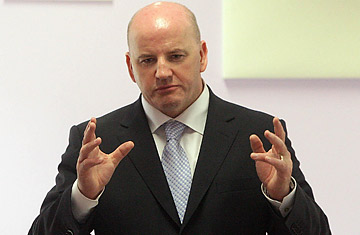
Irish presidential hopeful Sean Gallagher speaks in Dublin on April 10, 2011
(2 of 2)
The powers of the President in the arenas of jobs and immigration are limited, but Gallagher says he will "do for enterprise and job creation what President Mary McAleese did for peace" by using the office to promote foreign investment in Ireland. The role of President is "particularly unique at the moment," Gallagher tells TIME. "It is about breeding a sense of confidence at home ... and making people feel they are connected to the future. It's also about helping to represent Ireland and working with the government to drive trade, tourism and inward investment, because it has to be about creating jobs."
But as appealing as Gallagher's nonparty status is, his many years as a grassroots activist in Fianna Fail and his involvement in the party's governing board have cast a shadow on his campaign. In a dramatic twist on Monday, during the election's final television debate, former IRA paramilitary and rival presidential candidate Martin McGuinness accused Gallagher of collecting a $7,000 check from a convicted criminal who attended a fundraiser for former Fianna Fail Prime Minister Brian Cowen. After initially denying it, Gallagher said he may have received a donation from the man when delivering an event photograph. This issue, which looks likely to dominate the final days of the campaign, could be a game changer.
For his part, McGuinness, the Northern Ireland Deputy First Minister, had hoped to capitalize on the void left by Fianna Fail — which for the first time has not run a candidate — and set his Sinn Fein on a course to being recognized as a mainstream party. But his candidacy has been divisive. Campaigning in the seaside city of Bray he cautiously shakes hands and offers gentle smiles; still many passers-by avoid his gaze or put their hands firmly by their side when they see him approaching. While Sinn Fein's transition from guns to ballot box happened in Northern Ireland over a decade ago, many in the Republic still can't get past the killings of innocent civilians by the IRA over three decades of fighting for a united north and south.
So McGuinness, who admits to joining the IRA in the 1970s but denies ever heading the organization, has focused on selling himself as peacemaker: the man who was pivotal to the IRA cease-fire and brokered a historic peace deal more than a decade ago. His victory may now a distant dream — he sits third in the polls at 15% — although he will still emerge a winner having widened the base for his party.
In the end, the race may come down to energy vs. experience, with veteran politician Michel D. Higgins of Labour, the coalition government's center-left junior partner, in second place, according to the latest polls. Higgins has also spoken about the country's financial woes, but says he favors a "social economy" over Gallagher's "speculative economy." In the Dublin suburb of Tallaght, Higgins campaigns slowly but deeply, spending a long time with each of the voters he meets. He has a reputation as an independent voice within his party, but his position in government doesn't help with angry voter Paul Doran. "My children are being educated in prefabs [temporary buildings]," Doran says, confronting Higgins, "while we are spending billions sorting out a debt that is not ours." Not even the answer that Labour was the only party to vote against the bank bailout satisfies the voter, who may like many others see Higgins as part of the status quo.
Higgins' chances of winning are narrow, his hope lying in Gallagher's support dropping and getting a large number of "transfer votes" in Ireland's unusual proportional-representation voting system. The late revelations of Gallagher's taking money from an ex-con on behalf of Fianna Fail could prove toxic.
And while it's still a close race, one thing's for certain: whoever is elected will set the national tone for the most difficult economic period in Irish history — one through which the demoralized nation needs a strong moral compass.
